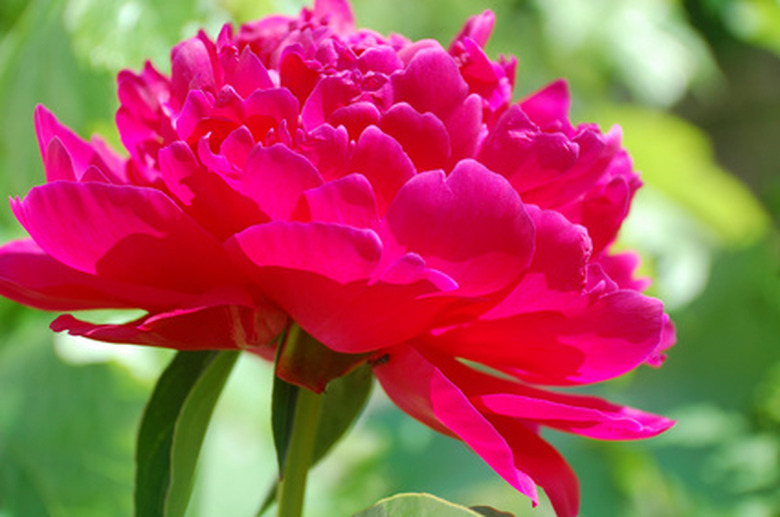Symbolism In The Jade Peony
Chinese geomancy aims to preserve harmony with nature in all aspects of living. Among them is the peony, one of the plants and flowers thought to symbolize the good things of life, personally, professionally and spiritually. The same applies to jade, historically prized above gold and silver by the Chinese, according to the All About Gemstones website.
Imperial Symbol
Ornamental peonies date back to the seventh century reign of the Emperor Yang of the Sui dynasty. But it was during the Tang dynasty (618 to 906) that peonies came under imperial protection and rose in stature and price, according to Paeonia.com. Peonies were part of dowries, for example, because they symbolized royal favor, prestige and prosperity. The finest jade was for imperial use only, according to the All About Gems website. A Ching/Qing dynasty throne screen fashioned from hardwood and inlaid with intricately carved jade symbols, once stood behind the emperor's throne. Its role was to attract good fortune and ward off evil. The central panel featured a vase of flowering jade peonies.
- Chinese geomancy aims to preserve harmony with nature in all aspects of living.
- The same applies to jade, historically prized above gold and silver by the Chinese, according to the All About Gemstones website.
Symbolic Significance
In the imperial domain, the term "jade peonies" meant exclusive to the emperor. Nowadays, jade peonies or simply peonies bring joy to a far greater audience, no longer confined to the Forbidden City. Luoyang City in China's Henan Province is home to an annual Luoyang Peony Festival between April and May. Visitors attend from all over the world. To the Chinese, the peony is akin to a national flower, and it is Luoyang's designated flower. The city grows over 500,000 peonies of more than 350 species. Heze City in Shandong Province cultivates more than 600 species of peonies. The Heze International Peony Festival also takes place in April and May. A State-funded research facility in Heze conducts research into peonies.
- In the imperial domain, the term "jade peonies" meant exclusive to the emperor.
- Luoyang City in China's Henan Province is home to an annual Luoyang Peony Festival between April and May.
- Visitors attend from all over the world.
Universal Good Fortune
Inspired by real peonies, hand crafted, decorative jade peonies, usually mounted on wooden display stands, are modern symbols of good fortune. Anyone can buy and display them nowadays, without imperial credentials. They are popular as gifts and as ornaments for homes and offices. Miniature versions of jade peonies are fashionable as cell phone ornaments, or attached to handbags, beckoning prosperity.
Attracting New Year Blessings
According to Chinese traditional beliefs associated with decor, the peony represents beauty, social status and luxury. It is among the prominent flowers at Lunar New Year time, when homes and offices decorate to welcome a new year. Red peonies are especially important to Lunar New Year celebrations because the Chinese consider the color red to be highly auspicious.
- Inspired by real peonies, hand crafted, decorative jade peonies, usually mounted on wooden display stands, are modern symbols of good fortune.
- It is among the prominent flowers at Lunar New Year time, when homes and offices decorate to welcome a new year.
Book Symbolism
Wayson Choy's 1995 novel, "The Jade Peony," explores Vancouver's Chinatown of the late 1930s and 1940s from the perspective of three Chinese immigrant siblings. The title refers to their grandmother's jade amulet, her treasured possession, bequeathed as a symbolic reminder of their Chinese heritage and cultural roots.
